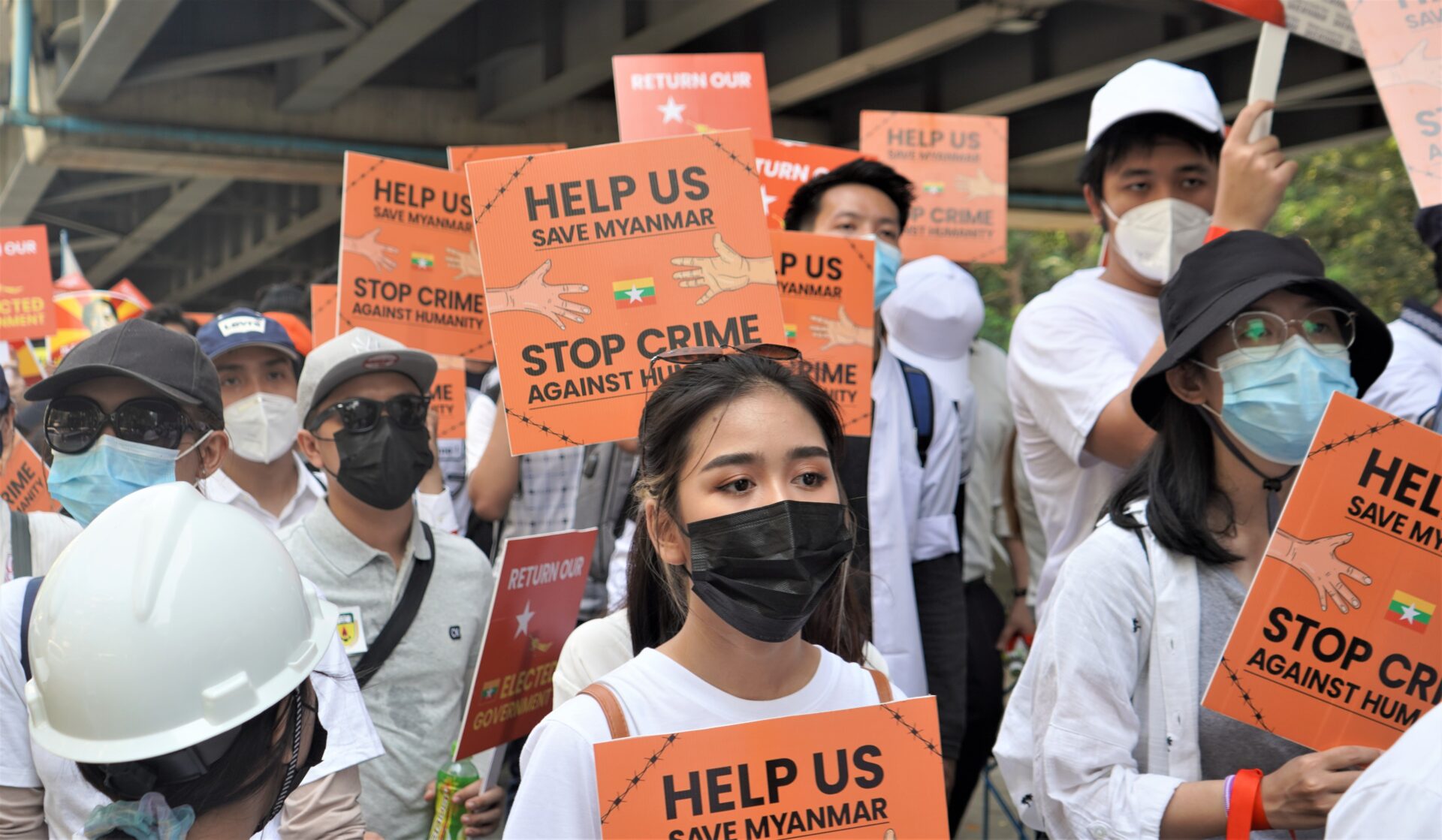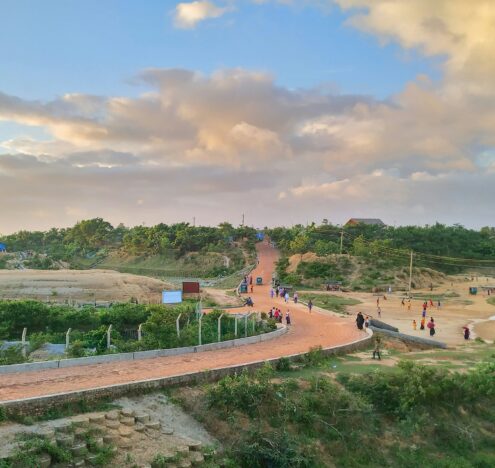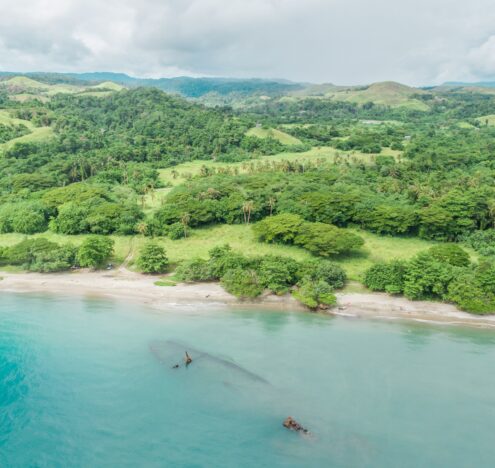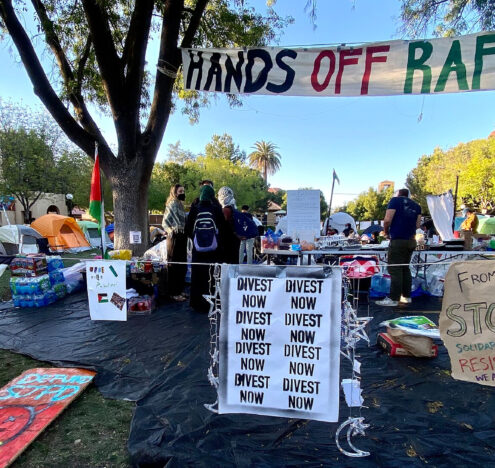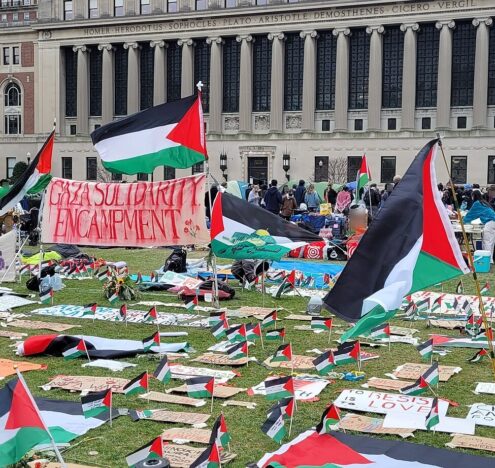August marks the 35th anniversary of the 1988 democracy uprising in Myanmar. It is known as the 8888 Uprising and saw hundreds of thousands of civilians, students, and monks participate in nationwide protests against government restrictions on personal freedoms and economic woes. The student-led movement began calling for democracy, and amongst the chants of “Daw aye, daw aye!” (“Our cause, our cause!),” Aung San Suu Kyi emerged as the leader of the movement, impressing the demonstrators with her strong calls for political stability and opposition to the repressive military regime.
The 8888 Uprising remains a powerful reminder despite its bloody end at the hands of the Myanmar military on September 18, 1988. It paved the way for future resistance to the military’s stronghold and oppression, continuing to inform pro-democracy movements and inspire millions of Myanmarese.
Yet, since the military coup on February 1, 2021, Myanmar’s long history of political instability, ethnic tensions, and human rights violations has escalated to a new level of violence and oppression. As Myanmar’s minority communities continue to suffer, it is crucial for the United States to recommit its support and efforts to protect minority and human rights as well as condemn the atrocities being committed.
Current State of the Myanmarese
Following the coup, Myanmar has been plunged into a state of chaos and brutality. The military junta’s grip on power has led to widespread violence against peaceful protestors, arbitrary arrests, and extrajudicial killings. Ethnic minority groups, such as the Rohingya, the Karen, and the Kachin, who have already endured decades of severe discrimination, are now facing intensified persecution. The Rohingya especially have faced a brutal campaign of ethnic cleansing, resulting in their mass exodus to neighboring countries, such as Bangladesh. Similarly, the Karen and Kachin communities have endured displacement, violence, and economic marginalization for decades. Reports of mass displacements, destruction of villages, sexual violence, and systematic human rights abuses paint a grim picture of the situation on the ground.
Life for the displaced Myanmarese is not any better. Discrimination, violence, anti-refugee sentiment, crowded refugee camps, lack of schools, and disease are common realities for the Rohingya who make it to Bangladesh, which became home to over one million Rohingya who fled persecution in Burma. In July 2023, following a visit from International Criminal Court prosecutors, six Rohingya refugees were killed in a clash between two rival groups operating in the camps. The killings aren’t an isolated event; just this year, more than a dozen refugees, including women and children, have been killed.
Food insecurity and recent funding cuts by the World Food Programme (WFP) are exacerbating tensions, and the formation of groups vying to control the security of the makeshift community are increasing the likelihood of violence. The United Nations pointed to a lack of funding by donors to explain the latest reduction — the agency budgets just twenty-seven cents a day per person. This is further underscored by the WFP’s Bangladesh Country Director Dom Scalpelli noting that so far, what has been received is just not enough.
A Weak Global Response
The vulnerable people of Myanmar need our solidarity and our support. Human Rights Watch noted that the European Union and France have been vocal in condemning the junta, going so far as to support UN resolutions urging the military to end its violence and restore civilian rule as well as back EU economic sanctions and travel bans. The recent UN Security Council resolution denouncing the military’s human rights violations reflects Myanmar’s increasing isolation and lack of support from traditional allies.
In 2021, the Biden administration formally determined that the military’s violent actions against the Rohingya amounted to genocide and crimes against humanity.The United States has placed a number of sanctions on key Myanmarese officials, banks, and arms dealers. In March 2023, the Department of Treasury sanctioned military-connected individuals who were responsible for importing, storing, and distributing jet fuel to the army, and its Office of Foreign Assets Control released a bulletin outlining the risks associated with providing jet fuel to Burma’s regime.
As Myanmar’s minority communities continue to suffer, it is crucial for the United States to recommit its support and efforts to protect minority and human rights as well as condemn the atrocities being committed.
Congress included provisions from the Burma Unified through Rigorous Military Accountability Act (BURMA Act) in its 2023 National Defence Authorization Act (NDAA). The BURMA Act established a clear strategy for the US towards Myanmar, authorizing humanitarian aid for impacted civilians as well as for sanctions against key military officials whilst also taking into account the humanitarian impact. Recent House and Senate resolutions denounced the military junta’s actions, called for the release of political prisoners, and reaffirmed support for Burma’s democracy, highlighting Congress’ interest in pressuring the Biden administration to take action. The House and Senate versions of this year’s NDAA have also included updated financial provisions of the BURMA Act, although the final amount for humanitarian and economic assistance is yet to be determined.
But these actions have not been enough to effectively stem the junta’s campaign of violence or stop it from engaging in mass atrocities. Even after the UN resolutions, EU sanctions, and US response, the junta has carried on killing, torturing, detaining, and arbitrarily arresting civilians, as well as blocking much-needed humanitarian aid from reaching millions of at-risk and displaced people. And it appears that the junta just does not care about its international image.
What US Actions Are Missing
The US administration’s repeated calls for accountability, public statements, and even sanctions are falling short. Numerous organizations, like Human Rights Watch and International Crisis Group, have already highlighted that the current sanctions are unlikely to have any impact on the junta nor are tough enough to make a difference. It’s easy for companies to circumvent the jet fuel sanctions to avoid penalties by either changing names or creating new companies. And if the administration wanted to be effective, these sanctions would be placed on international companies selling the fuel rather than the companies who are procuring it. Local companies are easily replaceable; large, international corporations — not so much.
Even Congress’ NDAA amendments fail to result in any major changes, despite being the toughest actions taken yet. The amendments are simply a watered-down version of the original BURMA Act, with almost every provision either modified or fully altered, diminishing the impact of the bill. For example, many of the strategic sanctions included in the BURMA Act were either left out or significantly limited in the final NDAA bill. The NDAA also did not, notably, include the establishment of a special coordinator for Myanmarese Democracy, which was part of the original BURMA Act. The coordinator was to oversee a multiagency implementation of US policy, ensuring a more streamlined and realistic approach within Myanmar.
Despite Congress paving the way for the United States to take a stronger stance against Myanmar’s military junta, the Biden administration has proven to be an obstacle for stronger action against the junta. It was the administration that objected to the BURMA Act provisions and urged for a diluted version. And the Biden administration has been reluctant to sanction key entities, fearing the junta’s potential shifting reliance on China. With potential sanctions on the gas and energy sector in Myanmar, the administration believes that the disruption would harm Thailand’s energy security, which imports pipe gas via the Yadana and Zawtika projects, and would encourage China to take over the gas fields. Myanmarese activists, however, have pointed out in correspondence with me that this concern is unlikely to occur since the Yadana gas fields are in decline already and a takeover of the fields would be too costly and too time-consuming.
Unfortunately, public awareness of the ongoing crisis in Myanmar has significantly decreased, and the passage of the 2023 NDAA meant that many policymakers assumed the crisis had been addressed. Concerted efforts from Myanmar coalitions have done a good job in providing updated information both about what’s happening in Myanmar and actions that governments are taking. But these same coalitions have voiced disappointment and disapproval of the administration’s unwillingness to get tough, making a dire situation even worse. Enforcement of existing policies and sanctions also needs to be improved. For example, banks can still pay and process funds for sanctioned entities simply because it’s done in US dollars rather than Euros, which actually does carry a penalty. Sanctions remain one of the most effective tools to force the military to take accountability but will continue to be pointless unless they are thoroughly enforced and strengthened.
So far, the greatest setback to the junta has been the US sanctions on the Myanma Foreign Trade Bank (MFTB) and Myanma Investment and Commercial Bank (MICB), which are essentially Myanmar’s foreign currency treasuries and were used to buy jet fuel, small arms production parts, and other products that could not be bought with Myanmar’s currency, the kyat. Moreover, the US sanctions were enough to encourage Singapore’s United Overseas Bank, used by many junta generals, to cut ties by September. These events have led Myanmar junta chief Min Aung Hlaing to complain about the “weaponization of the dollar.” It also highlighted how the road to substantial change, therefore, will lie in a rigorous enforcement and strengthening of sanctions as well as a strategic focus on international entities involved.
What many activists have noted, however, is that it’s even more important to sanction the military-controlled energy and gas sector (the Myanma Oil and Gas Enterprise or MOGE). The EU added MOGE to its sanction lists back in 2022, effectively targeting a key revenue source for the junta; its previous exclusion limited the effectiveness of other sanctions. Myanmar’s pro-democracy movements as well as the National Unity Government have long argued for the benefit of sanctioning this sector, noting that companies such as Chevron and TotalEnergies pay the military the revenue from offshore projects. If the US follows the EU in sanctioning MOGE, the military stands to lose over $1 billion a year, a significant enough amount to cause a massive disruption to its campaign of violence. For the time being, however, the US’ reluctance to place MOGE on its sanctions list signals its willingness to place the business interests of these companies and its lobbyists above the Myanmar people.
Sanctions alone will not end the violence in Myanmar. But a strict and genuine enforcement of stronger sanctions and especially a multilateral push to target MOGE can force the junta to rethink its consistent violations of human and civil rights and demonstrate an international readiness to finally hold it accountable. The international community’s disunity and disagreement when it comes to targeting the military’s financial lifeline as well as the US’ weak response will only bolster the junta’s violence and push for power. The current response is inadequate but it’s not too late to cut off the military’s finances; the sanctioning of MFTB and MICB is a step in the right direction and with more pressure from both Congress and the public, the administration can begin holding the junta accountable for its crimes against humanity and senseless brutality against Myanmar’s people.
Note: Inkstick uses “Myanmar” as naming convention; Emgage Action uses “Burma.” The name of the country has been changed from the original in this piece to reflect Inkstick’s style guide.














